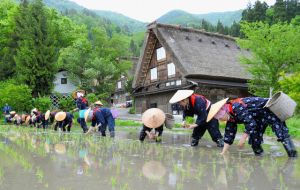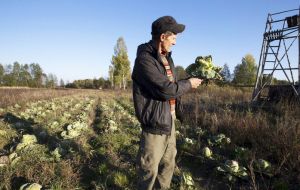MercoPress. South Atlantic News Agency
Wealthy nations expenditure on its farmers far outstrips global food aid
 Japan spends 59 times as much supporting its own farmers than on food aid and nutrition support, while EU countries spend 42 times as much
Japan spends 59 times as much supporting its own farmers than on food aid and nutrition support, while EU countries spend 42 times as much  “There are a lot of ways countries can give artificial support for their own farmers, hurting farmers in Asian or African countries”, said McArthur
“There are a lot of ways countries can give artificial support for their own farmers, hurting farmers in Asian or African countries”, said McArthur  Subsidies from the 31 OECD members includes direct payments to farmers, trade barriers to food from poor countries, and mandates for biofuels
Subsidies from the 31 OECD members includes direct payments to farmers, trade barriers to food from poor countries, and mandates for biofuels Wealthy nations spend 20 times more on farm subsidies than the US$12 billion they allocate to food aid and support for poor farmers annually, John McArthur, a senior fellow with the Brookings Institution, the think-tank which led the new research, said.
Japan spends 59 times as much supporting its own farmers than on food aid and nutrition support, while countries in the European Union spend 42 times as much and the United States spends 16 times as much, the Brookings Institution study said.
“There are a lot of ways countries can give artificial support for their own farmers, hurting farmers in Asian or African countries who could supply that (product) for better value,” McArthur told the Thomson Reuters Foundation.
Subsidies from the 31 members of the Organization for Economic Cooperation and Development (OECD), a group mostly composed of wealthy countries, included direct payments to farmers, trade barriers to food from poor countries, and mandates for biofuels, he said.
This support for farmers in wealthy countries can hinder food production in developing states, by artificially allowing food to be sold on international markets below the cost of production, hindering access for unsubsidized growers.
This process, known as “dumping” in international trade, discourages poor farmers from investing in their operations or ramping up production as they cannot fairly compete with subsidized crops. This in turn hurts food security in poor countries.
But it is not only rich-world subsidies that hurt poor farmers. Countries in Africa and Asia also need to invest more in infrastructure, fertilizer and crop insurance to help growers reach their potential to feed the 795 million worldwide who don’t have enough to eat. Undernourishment in the developing world has been falling by roughly one percentage point every three years.
But to eliminate hunger entirely by 2030, in line with UN Sustainable Development Goals, the speed of hunger reduction needs to significantly accelerate, McArthur said.
In Africa, the continent hit hardest by a lack of food and poor crop yields, some countries, such as Ethiopia, Malawi and Ivory Coast, have made major progress in the last decade, he said.




Top Comments
Disclaimer & comment rules-

Read all commentsThe only way to truly reduce hunger in the third world is to reduce population growth. 40 years ago China looked reality in the face and saw disaster if it's population continued growing at it's present rate. China instituted a one child/family policy, and made it work.
Oct 25th, 2015 - 04:38 am 0If 40 years ago third world countries had followed China's example, or even just a one person/one child policy, the third world would be better off today.
Commenting for this story is now closed.
If you have a Facebook account, become a fan and comment on our Facebook Page!